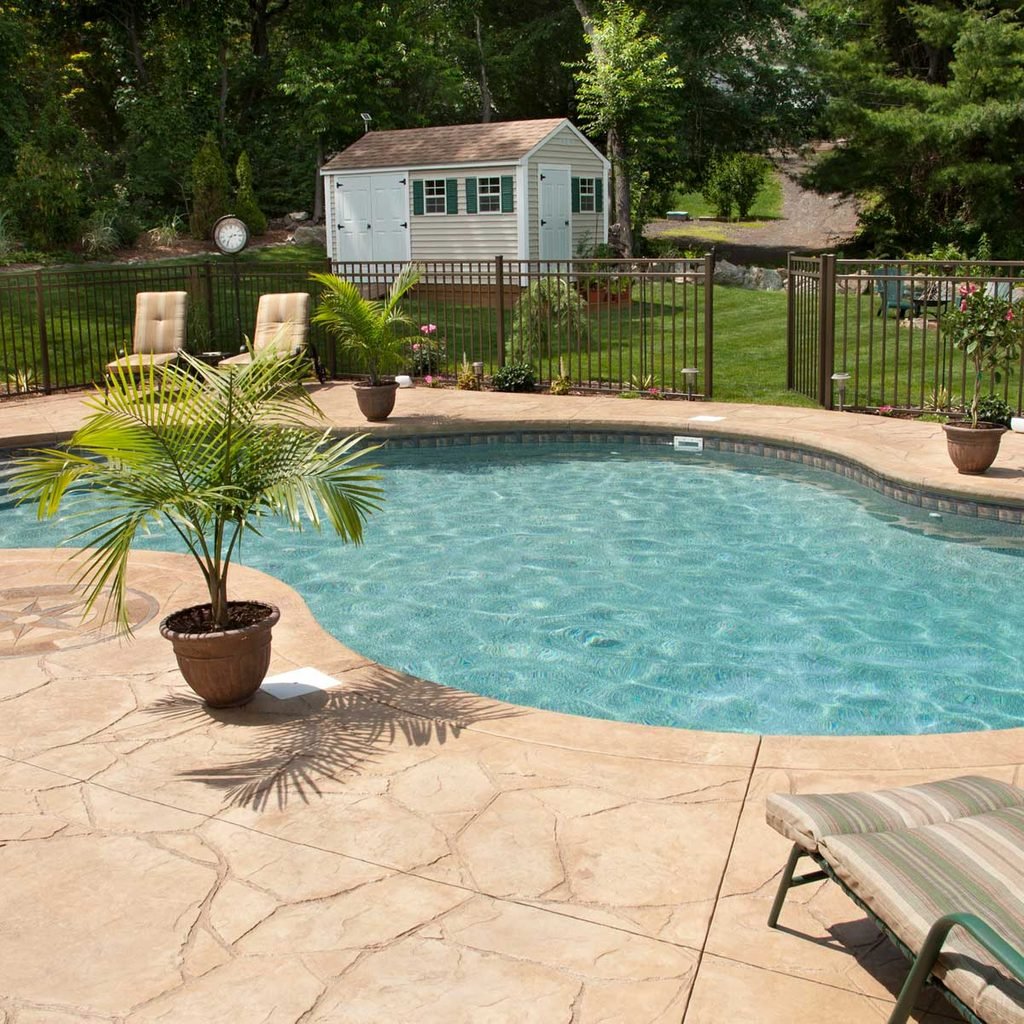Should I Get a Pool? What to Know Before Taking the Plunge
Updated: Mar. 20, 2023

A backyard pool is fun for the whole family. Here’s what you need to know before getting one.
Is a pool the only thing missing from your dream house? Here are a few things to consider before building that backyard oasis.
On This Page
Above-Ground vs. In-Ground Pools
Above-Ground Pros:
- A lower financial commitment because you don’t have to dig up your yard;
- Typically less than half the cost of in-ground pools.
Above-Ground Cons:
- They don’t last as long as in-ground pools;
- Shape and depth options are limited.
In-Ground Pros:
- More shape and depth options;
- With routine maintenance, they can last for decades.
In-Ground Cons:
- They can be quite expensive;
- More difficult to remove if you decide to get rid of it.
What Will a Pool Cost?
The first question after “Should I get a pool?” is usually “How much do pools cost?” The answer is, it depends. River Pools in Virginia estimates $4,000 to $12,000 for an above-ground pool and $30,000 to $70,000 for an in-ground pool. The wide in-ground price range is due to the many types of swimming pools, so your desired specifications will determine the final cost.
- Vinyl liner pools typically have the lowest up-front cost, but the liner will need to be replaced every five to nine years.
- Concrete pools are more expensive than vinyl liner pools but offer the best design features. They need to be resurfaced every 10 to 15 years.
- Fiberglass pools have a high installation cost but require the least maintenance.
There are many standard in-ground pool shapes, including the old standbys, rectangular and kidney. But don’t let them limit your imagination. Texas-based Foley Pools names free form pools as No. 7 on its list of the 10 most popular pool shapes. So if you have a small or oddly shaped yard, or if you dream of a one-of-a-kind water feature, you can get a custom design. Vinyl liner and concrete pools offer the most customizable shapes.
The majority of pools are sanitized with chlorine, but you can also get a saltwater or natural pool. Your chosen size, shape, landscaping and cleansing system all affect the final installation cost.
Safety and Security Features
Owning a pool does come with safety concerns, but you can minimize the risks by following recommendations from the U.S. Consumer Product Safety Commission (CPSC) and its Pool Safely initiative. Start by asking your contractor about compliance with local and national codes and regulations. Double-check that they use current, quality materials, such as anti-entrapment drain covers. At a minimum always follow the CPSC safety barrier guidelines, and know that many locales have specific fence requirements. Check if there are any additional requirements in your area. Pool Safely’s simple summer safety checklist outlines the main points from CPSC’s e-book:
- Enclose the entire pool with a four-foot fence. According to the e-book, a five-foot fence is better. Use a fence without foot holds to prevent children from climbing over it. Ensure that any openings in the fence are narrow enough to prevent children from crawling through it.
- Install self-closing and self-latching gate hardware that children can’t reach. Youngsters in your household or neighborhood should not be able to open the gate. The wind should not blow it open, and it should not be propped. The gate should swing away from the pool so that, if not completely shut, a child’s push will close it further. All gates should remain locked when not in use.
- If you must use your house as part of the fence, install alarms on any doors leading to the pool area.
- Install a power safety cover and keep it in good condition. A sturdy power cover provides a better barrier than a simple one. It also keeps out leaves and debris, so you’ll enjoy the added benefit of a cleaner pool.
- Along with a self-latching enclosure and a cover, remove or secure stairs and ladders to above-ground pools when not in use.
Maintenance Equipment
Once you’ve selected your style of pool and planned your safety barriers, it’s time to learn about managing all of it. A poorly-maintained pool will hurt your property value when the time comes to sell. A few essential accessories for any pool include:
- Net skimmer;
- Pool brush;
- Pool vacuum;
- Water testing kit;
- Sanitizers such as chlorine tablets, chlorine generator salt or pool shock;
- Balancers such as stabilizer, pH increaser or pH decreaser.
The manufacturer should outline how to care for your pool and when to perform routine maintenance. For example, concrete pools require more cleaning and chemicals because of their porous surface. An online crash course is good place to learn more. Swim University’s pool care cheat sheet is another convenient resource. However, pool chemistry is a complex field with entire professional certifications available. While such certifications are not necessary for private homeowners, you may prefer to hire a professional to close your pool in the winter or open it in the summer. It will save time and keep your pool in tip-top shape.